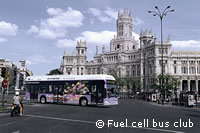The future of hydrogen vehicles
The European Commission presented the results of the Clean Urban Transport for Europe (CUTE) project at the CUTE conference in Hamburg on 10 May. The project developed hydrogen fuel cell-powered buses, and placed them on European streets. Hydrogen is a genuinely zero-emission fuel; its only 'waste' is water. The project is one of the largest funded under the Fifth Framework Programme (FP5), receiving 18.5 million euro of its 52.4 million euro budget under the programme. Since 2003, 27 hydrogen powered buses have transported four million people more than one million kilometres in nine European cities: Amsterdam, Barcelona, Hamburg, London, Luxembourg, Madrid, Porto, Stockholm and Stuttgart. European Energy Commissioner Andris Piebalgs said: 'This project marks a milestone in the history of clean transport energy technology and opens the way to a new era of sustainable transport systems. The question is no longer whether this technology works, but when will it be competitive.' The achievements so far have been impressive. Each city needed its own hydrogen supply chain and refuelling stations. These networks used more than 192 tonnes of hydrogen - 100 tonnes from renewable sources - and more than 9,000 successful refuelling stops - refuelling is the most dangerous part of the hydrogen chain. The next stage will be to push the Hydrogen for Transport initiative, introducing 200 hydrogen-powered vehicles on the streets of Europe and beyond. Extending the hydrogen infrastructure will present more problems. While the vehicle technology is proven, as CUTE has shown, the corresponding infrastructure needed for refilling and storing hydrogen presents more challenges. Hydrogen is a highly inflammable gas. The investment will come from a private-public partnership of 105 million euro. The European Commission will contribute a little under half - 48 million euro. This investment will go to a series of hydrogen projects. HyFLEET:CUTE rolls out CUTE to 50 hydrogen fuel cell-powered buses on the roads in three continents. Amsterdam, Barcelona, London, Luxemburg, Madrid and Reykjavik will have buses in Europe, while Beijing in China and Perth in Western Australia will also join the scheme. In Berlin, 14 buses using hydrogen as fuel in a conventional, but modified, internal combustion engine will go into service. The ZERO REGIO project will run eight fuel cell cars in Frankfurt (Germany) and Mantova (Italy), and HyCHAIN:MINITRANS will run 158 vans, mini buses, scooters and other small vehicles in France, Germany and Italy. Analysts believe that small work vehicles could be an entry point for hydrogen powered vehicles.
Countries
Australia, China, Germany, Spain, Iceland, Luxembourg, Netherlands, United Kingdom



